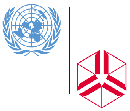
network of research and training centres and programmes
Issue 18: July-August 2002
 |
UNU Update | |
| The newsletter of United Nations
University and its network of research and training centres and programmes |
||
|
Issue 18: July-August 2002 |
||

Let's get together against terrorism By Jayantha Dhanapala and Ramesh Thakur As we contemplate the awful prospect of terrorists using weapons of mass destruction, it is worth examining the merits of setting up an international commission to propose practical solutions. The mid-1990s was the zenith of arms control and disarmament. It proved a false dawn. Recent trends, fueled in particular by fears of terrorism after the horrific attacks on the United States last September, point in the opposite direction - toward a new dark age for disarmament as weapons of mass destruction and the means to deliver them spread not just to more states but to terrorist groups and other so-called substate actors. To try to prevent this, it is time to establish an International Commission on Weapons of Mass Destruction. Its mandate should cover nuclear, biological and chemical weapons that the nuclear nonproliferation treaty and biological and chemical weapons conventions have targeted for total elimination. The commission's mandate should include both nonproliferation and disarmament. One cannot be sacrificed for the other. It should also cover possible terrorist uses of such weapons and ways of countering such threats. One approach would be to set the commission up as a special United Nations panel; the other would be to have an independent commission. Either way, it should develop new ideas and explore practical means for applying them. It should examine how to achieve sustainable disarmament, where arms are reduced to the level necessary to assure the national security needs of today's peoples and states without threatening the security and development needs of other countries and future generations. It should look closely at verification technologies to eliminate all weapons of mass destruction and prevent new ones from being developed. The commission's report could serve both as a call to action and an authoritative instrument for governments and nongovernment organizations in advocating greater progress on disarmament. It could propose new approaches on how to verify compliance with the Biological Weapons Convention, expedite the entry into force of the Comprehensive Test Ban Treaty, and provide a road map for dealing with terrorist use of weapons of mass destruction without succumbing to overreaction or panic. Having two co-chairs, one each from the North and the South, would be a political asset in harnessing legitimacy in both camps. The commission must comprise world-renowned and respected experts. It should be backed by an efficient secretariat, a politically attuned advisory board, the capacity to undertake in-depth research, and adequate funding. Follow-through will be vital. International commissions need not be culs-de-sac. They can lead to breakthroughs in conceptual thinking with practical policy implications - like the Brundtland commission's proposal for sustainable development, or the International Commission on Intervention and State Sovereignty with its innovative concept of the responsibility to protect. Such advances are urgently needed to head off the spread of weapons of mass destruction. Jayantha Dhanapala, the UN undersecretary-general for disarmament, was president of the 1995 nuclear nonproliferation treaty conference and a member of the Canberra Commission on the Elimination of Nuclear Weapons. Ramesh Thakur, vice rector of the UN University in Tokyo, was a consultant to the Canberra commission and a member of the International Commission on Intervention and State Sovereignty. This personal comment appeared in the International Herald Tribune on June 4. |
|
Copyright © 2002 United Nations University. All rights reserved. |